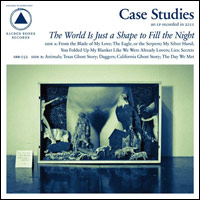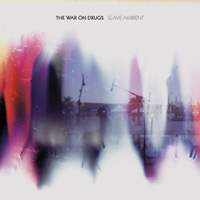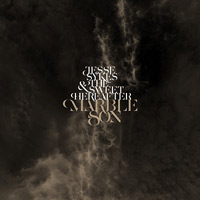
The World Is Just a Shape to Fill the Night
Sacred Bones
Jesse Lortz hasn’t been feeling too well lately. He got divorced around the time The Duke & the Dutchess put their last album out and less than a year later that band broke up. So, it’s encouraging that he was able to take the sad sack of shit that life delivered to him and turn it into such a lively record. There’s no “up with people” intent, but you get to ride the rocky road through Jesse’s songs as he mourns his marriage, misses his bandmate, and figures out how to make good music with his remaining compadres.
For the mourning part, Jesse turns to his inner Leonard Cohen, a facet that’s obviously been there along, but was pretty well covered-up by the tendencies of his previous outings. Maybe, like many of us would, he relied on Songs of Love and Hate after the break-ups. “From the Blade of My Love” is a Cohen-worthy song title itself, but it over-reaches for the requisite lyrical richness. “My Silver Hand,” however, mines similar emotional territory using a much lighter touch, bringing an accomplished, ironic tone to the song as Lortz playfully trots out rhymes like “I’d like to still be in your bed. I would settle for your life instead.”
The second half of the album, especially “Secrets,” returns to the Stonesy aesthetic for which the Duke is best known, and it comes off remarkably authentic, thanks in large part to producer Greg Ashley (of the Gris Gris), who preserves the casual, intimate atmosphere of the recording process. The highlights of the album emerge in those moments when Jesse is joined by friends who stopped by the cabin in Wisconsin where the album was recorded to take pictures, sing songs, and presumably, cheer him up. Sounds like they did a pretty good job, since Lortz has somehow produced a miserable break-up album that might actually lift your spirits.
Matt Slaybaugh

Slave Ambient
Secretly Canadian
Stack up The War on Drugs’ latest record, Slave Ambient, to Kurt Vile’s 2011 entry, Smoke Ring for My Halo, and there’s certainly cause for the chicken and the egg debate. While The War on Drugs is where Vile cut his teeth before going solo, there are moments on Slave Ambient in which the group’s founder, guitarist and vocalist Adam Granduciel, could be guilty of letting Vile’s slacker cadence and existential journeyman drawl enter the fold. The similarities between the two are unmistakable. Regardless of what came first or who made who, before these two began their rambling ways, there were Neil Young, Tom Petty and Bob Dylan, who begat quieter troubadours like Dean Wareham (Galaxie 500) and Mark Kozelak (Red House Painters), guys Vile and Granduciel could likely call their true influences. Luckily, both songwriters cobble together the best traits of that list of artists to make atmospheric roots music all their own.
Perhaps, twin minds separated, the differences are more than apparent. (I’m convinced Granduciel has a massive Dead collection and Vile has none.) Where Vile’s Smoke Ring for My Halo tends to gravitate towards prophetic lucidity, Slave Ambient is drowsy and hypnotic, smudged and blurred, clinging to the mirage of a band with the propensity to jam infinitely, but managing to subconsciously erase minutes off the actual runtime by playing vaporous psych music. The title is apt, as The War on Drugs not only deals in virtuoso folk, which is tastefully and economically arranged, they also expand upon those heavily reverberated jamborees with their own blend of ambience, be it organ drones, cascading synths or just allowing for the distorted visage of the guitars to catch up with the rest of the song. Tiny instrumental illusions like “The Animator” and “Come For It” bridge the album’s more ambling and epic moments, like “Your Love Is Calling My Name” and Slave Ambient’s luxurious centerpiece, “Come to the City,” adding a flowing layer of depth to the record. Were The War on Drugs without this penchant for dragging us down the road, the record would be a trite collection of well-worn gimmicks (locomotive rhythms and wheezing harmonica) and half as long. As such, The War on Drugs has refined its skills, taking almost four years to record Slave Ambient. In the process, they found exactly who they are as a band: the purest strand of roots music, born in the wooly environment of Philadelphia’s psychedelic scene and consequently stretched across the cosmos.
Kevin J. Elliott
MP3: “Come to the City”

Marble Son
Station Grey
On her new album with the Sweet Hereafter, Marble Son, the smoky-voiced Jesse Sykes indulges aspects of her sound that merely lurked in the shadows on pervious records, while also refining and scaling back on other more pronounced elements. While she hasn’t completely abandoned her earlier twangy Americana musings, her distinctive vocals are applied more in service of sprawling, prog-like jams and meditative psych-folk, replete with the sort of hard-fought wisdom that emerges only with age and experience.
The eight-minute-plus album opener, “Hushed By Devotion,” has a cosmic, widescreen scope and establishes the album’s basic musical template of tangled classic-rock riffage and ghostly folk. Beginning with a surge of feedback and a foreboding riff followed by Sykes’s brooding incantation, the song builds on a pattern of stoner crunch and hushed ruminations. The band then suddenly sets off on a heady, jazzy jam that powers through to the song’s conclusion.
At 11 songs spanning nearly an hour, Marble Son can be an exhausting listen. And Syke's lyrical style, rooted in a kind of post–Age of Aquarius sense of introspection and metaphysical impressionism, does nothing to lighten the load. With former Whiskeytown founder Phil Wandscher leading the charge on guitar for the Sweet Hereafter, the band’s rootsy Dead/Allmans/Crazy Horse leanings haven’t been usurped by full-on Sun O))) drone, but there’s still a somber pallor hanging over much of the album that can occasionally feel ponderous. “Come to Mary’s” mantra of “come to Mary, she don’t mind” is on the one hand lovely, while on the other almost gloomy. Elsewhere, Syke’s declaration that the “world is wicked but I feel fine, everybody gets their time” isn’t so much comforting as it is ominous. So when the relatively sunny, jaunty “Ceiling High” emerges from the doomy fog with its burbling near-melody and rootsy groove midway through the collection, one feels a palpable sense of relief.
All that said, Marble Son is a thoughtful, well-constructed set of songs built on a textured blend of rock and folk poetics. And Sykes is possessed of a unique voice that exudes a remarkable amount of strength while maintaining a tasteful austerity. So despite this not being a particularly carefree album, one has to respect Sykes and her cohorts for making a record ostensibly as much for their own piece of mind as for their audience’s pure enjoyment.
Nate Knaebel

Overlook
Saddle Creek
Though she’s traversed the country on her own and as one-half of the now-defunct Azure Ray, logging stints in the indie capital of Omaha, Nebraska, as well as Los Angles, California, in the end, Maria Taylor’s Southern roots called her home. It was in Birmingham, Alabama, her hometown, that she wrote and recorded her latest solo effort, the gracefully introspective, Overlook.
The album, which employs a plethora of Birmingham musicians, truly encapsulates an easygoing sound evocative of the laidback vibe found south of the Mason-Dixon. The introduction of lap steel, bass and keyboards throughout strategically breaks up rambling sections of guitar strumming, thus creating compelling, fresh soundscapes in which Taylor’s delicate voice thrives. From the beautiful, breathy harmonies on “Masterplan” to the blues-infused “In A Bad Way,” Taylor creates a winding narrative of life well-lived and a world well-traveled. Here, as elsewhere, her imaginative, deeply descriptive lyrics are exemplary. “Like It Does” is another sultry, bluesy tune that continues the ambling pace set up by the tranquil “Happenstance,” but it unfolds quickly and gives way to the twangy pop number, “Bad Idea,” which is a pleasant departure from the norm. Thanks to pacing like this, the album ebbs and flows, keeping the listener on their proverbial toes.
If thrown into the sea of female singer-songwriters ranging from forces like Joni Mitchell and Carly Simon to the slew of ’90s ingenues, Maria Taylor manages not only to stay afloat, but to stand out. Then again, she’s a seasoned pro, and Overlook is a fine testament to her abilities.
Jennifer Farmer

Her Space Holiday
No More Good Ideas
Over the 15 years of his career as Her Space Holiday, Marc Bianchi has cranked out eight albums, six EPs and countless remixes. The inadvertent godfather of indietronica, his melancholy brand of electronic music translated the angst normally associated with indie rock to computers, and he inspired a generation to plug a sampler and a laptop into the four-track instead of a guitar. But all things must come to an end, and Bianchi has declared his new self-titled album to be the last under that name.
As such, the natural inclination is to look at the album as the definite statement on Her Space Holiday. That would be a foolish assumption to make. In 2008, Bianchi stepped away from his computers and created a record using entirely live instrumentation. The resulting album, XOXO, Panda & The New Kid Revival, featured nary a bleep nor a bloop. Her Space Holiday continues along that path with guests such as Eyad Kaileh (Indian Summer), Dave Wingo (Ola Podrida) Caroline Lufkin (Mice Parade/Caroline), Matt Shaw and Nick Andre (City Light), Ann Yu (Love Like Fire/Silver Swans), 4 Bonjour's Parties, and Phoebe Ceresia. On the surface, it’s like no HSH record before.
The difference is immediate, obvious and striking. The record has an orchestral pop vibe, with sophisticated arrangements as meticulous as Bianchi’s computer-based compositions. There is also a healthy does of acoustic guitar and the unapologetic appearance of banjo, so there’s no way that a casual fan would ever equate this with the HSH of old. The most amazing thing, though, is it sounds as natural as can be. While someone else might be tempted to hedge their bets and revert to the old style, Bianchi goes whole hog.
The one thing that has remained a constant is the lyrical voice and thematic content. While there are moments of joy, the undercurrent is decidedly melancholy. But Bianchi doesn’t just wallow in darkness; he faces his problems head on. That simple, but profound, twist makes Her Space Holiday the perfect coda.
Dorian S. Ham
ALBUM REVIEWS
Tunnels, The Blackout
Jeff Bridges, Jeff Bridges
NewVillager, NewVillager
The Duke & the King, The Duke & the King
Boston Spaceships, Let It Beard
Moonface, Organ Music Not Vibraphone Like I'd Hoped
Richard Buckner, Our Blood
Ursula 1000, Mondo Beyondo
Buffalo Killers, 3
Fungi Girls, Some Easy Magic
Wu-Tang, Legendary Weapons
Fruit Bats, Tripper
Machinedrum, Room(s)
Widowspeak, Widowspeak
